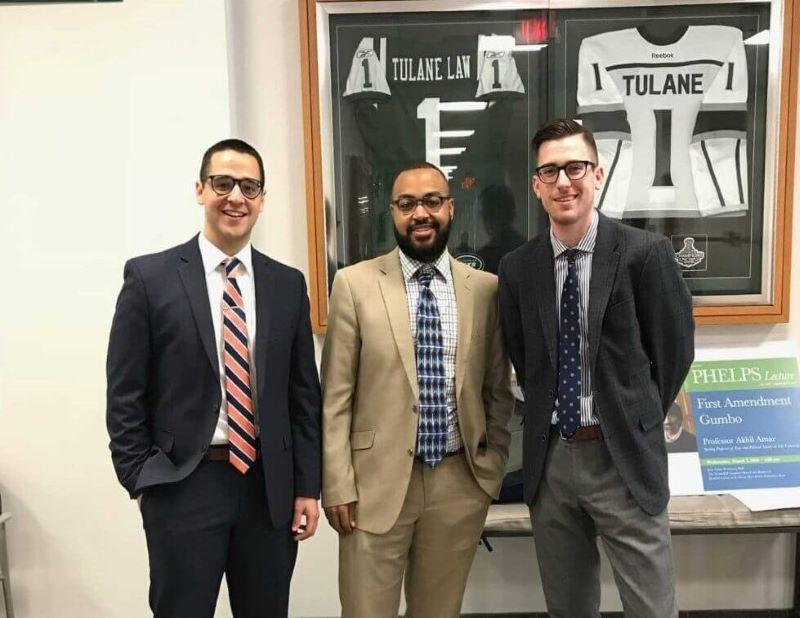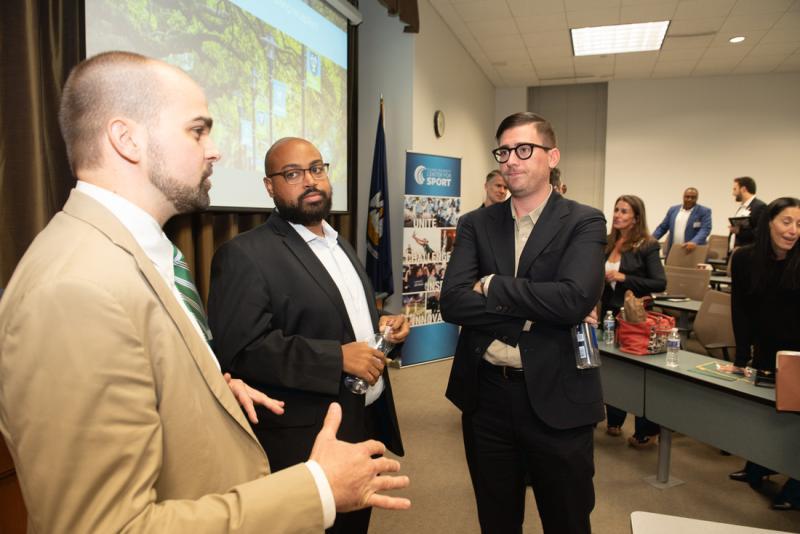Tulane Pro Basketball Competition is becoming the NBA’s spring “it” event
The spring semester for Tulane’s Sports Law Program comes alive almost immediately in January, with student-run arbitration and negotiation competitions – four in all – taking center stage over the ensuing three months.
In the world of the NBA, the Tulane Pro Basketball Negotiation competition increasingly has become the go-to event – the one that agents, front-office, and league execs circle on their calendars.
In 2023, the Athletic called it “one of the most anticipated meetups for a segment of the league – a niche affair for a growing cohort of NBA front offices.”
Not bad for a student-run negotiation competition, one that is just entering its 7th year, and where dozens of law school students compete and prove their expertise in NBA salary cap, strategy and negotiation.
“From our very humble beginnings we knew this was a sustainable competition and one that would help people connect,” said Tulane Law alum Tim Edwards, who co-founded the event with classmates Chris Robinson, both from the Class of 2018, and Victor Rivera Labiosa (L'19). “Thanks to all the press coverage and the hard work of a lot of students, it certainly has exceeded our expectations, especially in its first six years.”
Robinson is the Manager of Basketball Strategy at the Utah Jazz, while Edwards is an Analytics Coordinator/Basketball at Excel Sports Management.
The basketball competition has grown from what was a small, fledgling event in 2018 (one judge, one Tulane Law alum, five teams, two of them from Tulane Law), to the competition to attend for law students interested in basketball, where rubbing elbows with front-office NBA cap execs and league lawyers is not only expected but encouraged. Last year, dozens of teams competed in front of 45 judges; multiple law students walked away with job interviews and a number met their future employers there. The competition today is in the enviable position of managing its size to maintain that close-knit experience, said Robinson.
“I would have never believed that could happen in the first year or two,” said Robinson.
Last year’s competition winner, Nick Russo of Indiana University Law, for example, is now working with the San Antonio Spurs in a seasonal fellowship after making a contact at the competition.
“I reached out to my now-supervisor at the Spurs after the competition and over the summer we met up. He then brought up the possibility of this fellowship,” said Russo, who is the Spurs’ Basketball Strategy Fellow while he finishes his last year of a JD/MBA.
“I think it speaks to the willingness of the judges to connect with students and continue to stay in touch later,” added Russo.
A year after winning, Russo said doors have opened for him. “My network is definitely much larger today than at the same time a year ago,” he said.
basketball competition and in mentoring Tulane Law students. Here,
they speak with Sports Law Program Manager Eric Blevins (L'11)
during the 30th anniversary of Tulane's top-ranked program.
The basketball competition, Edwards said, is a credit to its first two judges – who remain involved to this day -- Tulane Law alum Andrew Baker (L’ 15) (at the time with the Brooklyn Nets, and now Senior Director of Salary Cap & Strategy with the Dallas Mavericks) and the competition’s “godfather” Stephen Mervis, Vice President of Basketball Strategy with the Orlando Magic.
“They really have stayed with us and worked to make sure this could be something uniquely special and useful to both judges and students,” said Edwards.
Teams and agencies, too, interested in finding the next generation of basketball strategy talent to build their brand across the evolving sports landscape, find it useful.
“It’s a great place to see who can think creatively about both sides of a problem,” said Edwards, adding that he has a short list of students he wants to talk to each year at the competition.
Both Edwards and Robinson said that Tulane’s competition gets its charm from the fact that it is largely student-run. On the days of the competition, Tulane sports law students manage all the logistics of the event: monitor rounds, make sure every detail is sorted, and play host to all other law schools and the judges.
Students from other law schools come to compete and network in the hallways after rounds with the judges who heard their arguments. After each round of competition, judges give each student individual feedback – strengths, insights, areas to improve.
“You can’t beat that kind of face time,” said Robinson.
This year, Tulane third-year law students Paige Etherington, Nico Prendes, Davis Rourke and Zach Windham are running the event.
"I'm so thrilled with what our Board was able to accomplish with last year's competition," said Etherington. "We were overseeing more than 40 teams competing at such a high level and hosting some of the most influential NBA professionals. I can't wait for the 2024 competition to grow bigger and be even more fierce."


